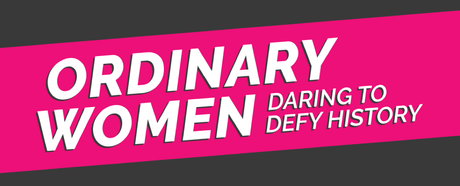
Credit: Anita Sarkeesian
From her popular video series Tropes vs. Women in Video Games to her work regarding online harassment, Feminist Frequency founder Anita Sarkeesian has unfailingly committed to critiquing and analyzing sexism in popular culture. Now she’s continuing this impressive legacy with a new series: Ordinary Women: Daring to Defy History — the first episode of which is now live. Each video in the five-episode series will feature original animation and focus on the life and work of a different woman in history who challenged the status quo and did incredible things, even if history wasn’t ready to acknowledge it: Murasaki Shikibu, the author of the first modern novel; Emma Goldman, a political revolutionary; Ching Shih, a pirate captain; Ada Lovelace, the creator of the first computer program; and Ida B. Wells, a journalist and civil rights activist. The uncompromising lives and accomplishments of the five women in this series are a reminder that the stories we tell about women—in TV shows, comic books, video games and in real life—too often reflect the stereotypes and limitations that have been placed upon them, rather than the world-changing feats they have already achieved, often against incredible odds. Sarkeesian recently spoke to the FBomb about her new series and the importance of her continued work to fight sexism and increase female representation.What inspired you to start this series? Why do you think it’s important to learn about so-called “ordinary” women?
Ordinary Women was inspired by the kinds of stories I was seeing about women, and the kinds of stories I largely wasn’t. Whether in history class growing up or in movies or games, I so often encountered stories in which women were supporting characters in the lives of men. Those men often did bold, pioneering, important things, but the women were frequently relegated to being the wife or the mother, and I rarely came across stories that centered the lives and accomplishments of women. And it’s not because women haven’t accomplished extraordinary things! It’s just that those stories aren’t being told. That’s part of what the title, “Ordinary Women,” is about: the idea that it’s ordinary for women to do extraordinary things, because women always have. I think it’s important to tell these stories because our sense of what women have done in the past impacts our perception of what women can and should do in the present and the future.
How do you think this series fits into the current landscape of the way feminism is popularly depicted in the media (especially the rise of “femvertizing” and focus on “squads” and “empowerment”)?
I think that there’s something really appealing and inspiring about the ways in which the personalities of the women we’re featuring in our series come through in each of the episodes. Just like we need great fictional characters that we can see ourselves reflected in, it’s powerful to have these historical icons we can look at from the past, and I would love it if some viewers thought of the five women we feature as a kind of squad. Each of them brings something very different and unique to the table, and it’s fun to imagine what sorts of adventures they might get up to together.
When it comes to “femvertising,” I’m very much opposed to the notion that any product you can purchase can liberate you from oppression. That’s not where liberation happens. All of the women we’re featuring in our series faced varying degrees of cultural oppression. Murasaki Shikibu, for instance, learned Chinese at a time when women were typically excluded from doing so and wrote the first novel in Japan in an era when women’s names weren’t even recorded. Jumping ahead almost a thousand years, Ida B. Wells was an investigative journalist who did really important work about lynching, and she was also active in the women’s suffrage movement, even while, as a black woman, she was often discriminated against within the movement. So I think these stories communicate a feminist philosophy that’s rooted in really pushing back against oppressive social systems.
How did you choose each woman you will profile in the series?
We started with a list of around 50 women and culled it down to five. It definitely wasn’t an easy process, but we knew that we wanted to represent women from different cultures and different time periods throughout history, as well as women whose accomplishments were in a range of fields. And because breaking down our limiting ideas of who and what women can be means acknowledging that women can be villains as well as heroes, we included Ching Shih, a 19th century pirate who terrorized the China Sea with her massive fleet.
Can you describe how your work with Feminist Frequency has evolved? What do you hope the organization more broadly accomplishes?I think it’s been a natural progression to Ordinary Women. Our series Tropes vs. Women in Video Games brought me into contact with game creators who would sometimes say that women in their games were relegated to minor or passive roles because “that’s the way it was back then,” which just emphasized for me how important it is that we be exposed to stories that communicate the reality that women have always been accomplishing amazing things. I hope that Feminist Frequency continues to be part of a cultural discussion that encourages us to abandon those kinds of false and limiting ideas, and helps to encourage more inclusive representations of all women.

